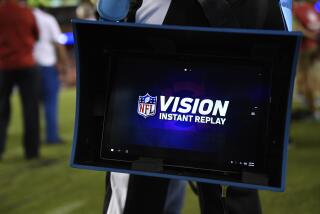California limits workers’ comp sports injury claims
After more than a year of intense lobbying by professional sports leagues, California has slammed the door on most athletes looking to file injury claims in the state, including those with serious brain injuries.
Gov. Jerry Brown on Tuesday signed legislation that significantly limits workers’ compensation claims by pro players. It’s a significant victory for the National Football League, which has been trying to reduce its financial exposure to concussions and other brain injuries that former players allege are the result of repeated blows to the head.
In August, the league agreed to a $765-million settlement with more than 4,500 former players. They had sued the NFL in federal court over the lasting effects of concussions, which have been linked to dementia and other debilitating illnesses. That landmark deal was viewed as a bargain for the league, considering the gravity of the injuries and the bad publicity the lawsuit generated for the sport.
The NFL’s legislative win in Sacramento could be far more valuable over the long term. It allows the league to sidestep exposure to thousands of serious head and brain trauma claims by out-of-state players who are no longer eligible to file in California.
The bill, signed without comment by the governor, was the subject of nearly 18 months of lobbying by the NFL, Major League Baseball and other major sports leagues and workers’ compensation insurers. It ultimately found the backing of nearly every member of the Legislature; just five voted against it.
Supporters said the system was being abused by greedy athletes looking for a big payday. The bill’s sponsor, Assemblyman Henry T. Perea (D-Fresno), said that the athletes’ claims place a heavy burden on California and its employers and should be lodged elsewhere.
“Our workers’ compensation system will no longer be unfairly targeted by out-of-state professional athletes,” he said.
But critics said it allowed wealthy teams and their insurers to duck responsibility for employees injured on the job.
“It’s a sellout to the billionaire owners” of professional teams, said Melissa Brown, a workers’ compensation attorney in Sacramento. “Players are suffering these terrible injuries, especially the older ones. They are going to be without a remedy.”
Since 2006, more than 3,400 former NFL players have filed for workers’ compensation in California alleging head or brain injuries, with many claiming dementia and other incurable neurological conditions. Some of the game’s greatest players — including Earl Campbell, Deion Sanders and Tony Dorsett — are among those who have made head injury claims.
Under terms of the new law, such filings will no longer be permitted from athletes who did not play on a California team for at least two complete seasons. In addition, those who spent seven or more seasons playing outside the state will also be unable to file, even if they meet the two-season California requirement.
The bill is retroactive to Sept. 15, meaning that any claims filed by affected athletes from that date are invalid.
Workers’ compensation is an employer-paid insurance system administered by states. It pays benefits to workers injured on the job, who in turn are precluded from suing their employers.
Critics contend that the new law benefits a very profitable special interest and will have little tangible benefit for the state as a whole.
Modesto Diaz, a Santa Ana workers’ compensation attorney specializing in athletes, said the leagues capitalized on the widespread — and mistaken — belief that taxpayers bear the costs of successful claims.
The lobbying campaign took advantage of “an unsuspecting Legislature and an uninformed general public,” Diaz said. He said the irony is that hundreds if not thousands of seriously injured former players may now have to turn to Social Security Disability Insurance, Medicaid and other forms of government aid.
“Taxpayers are going to wind up footing the bill for the treatment these people are going to need down the road,” Diaz said.
At the center of the debate is California’s unusual workers’ compensation system, which has become a refuge to many injured athletes.
California is one of only a handful of states to recognize cumulative trauma, a category of injuries that are incurred over time. Those include arthritis, back injuries and terminal brain disease such as chronic traumatic encephalopathy, which has been linked to contact sports.
In addition, California’s statute of limitations for workers’ compensation filings includes a provision allowing some workers to file long after retirement. Most states have stricter time limits for filing.
That has made California a magnet for claims from players who develop serious brain injuries years or even decades after their careers have ended.
Since 2006, more than two-thirds of all cumulative trauma filings by athletes in California have come from those who played for out-of-state teams, state data show.
Successful workers’ compensation claims are paid by either the employer or its insurer. In addition to cash, awards often include lifetime medical coverage for injuries, which can run into the hundreds of thousands of dollars for serious debilitating injuries.
In most major sports, insurance premiums are included in the salary cap, meaning the players in effect absorb the costs of their own coverage. But because the NFL does not offer lifetime healthcare to its players, those who cannot file workers’ compensation claims despite having legitimate injuries may be forced to pay for their own medical costs.
And only a small portion of former players made enough money during their careers to be able to afford private insurance. The average career of a football player is fewer than four years, and many of those making claims in California played in the 1970s and 1980s, when salaries were far lower.
The new law, AB 1309, applies only to professional football, baseball, basketball, ice hockey and soccer. In addition to major league athletes, it also covers minor league players whose compensation can be as low as a few hundred dollars a week.
Organized labor opposed the bill on concerns that it could embolden employers and insurers to propose legislation barring claims from other out-of-state workers, including flight attendants, truckers and salespeople whose jobs bring them to California.
“This is a terrible precedent for players and a more dangerous precedent for all workers,” said Angie Wei, legislative director of the California Labor Federation.
Times staff writer Armand Emamdjomeh contributed to this report.







